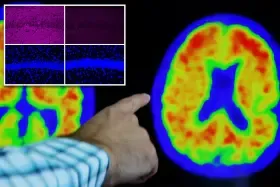(New York Post) Scientists at MIT have unlocked a major breakthrough in the battle to reverse the effects of Alzheimer’s disease — one that shows “dramatic reductions” in neurodegeneration, a report stated.
The exciting achievement came about after researchers were successfully able to interfere with an enyzme typically found to be overactive in the brains of Alzheimer’s patients.
The hyperactive enzyme, CDK5, was treated with an unnamed peptide, or string of amino acids.
Early tests conducted on mice revealed significant — and promising — results.
“This peptide has the ability to enter the brain and in a couple of different models, the peptide shows protective effects against loss of neurons and also appear to be able to rescue some of the behavior deficits,” study author Li-Huei Tsai, director of MIT’s Picower Institute for Learning and Memory, told The Post.
The hope, with further testing, is that this particular peptide might be a treatment for dementia — particularly dementia brought on by CDK5 overactivity.
 Researchers introduced an unnamed peptide, or amino acid chain, to see if it could counteract the effects of the hyperactive enzyme found in Alzheimer’s patients.Shutterstock
Researchers introduced an unnamed peptide, or amino acid chain, to see if it could counteract the effects of the hyperactive enzyme found in Alzheimer’s patients.Shutterstock
The errant enzyme is triggered by a smaller protein called P35, which, in AD patients, can become harmful when “cleaved” into a smaller protein known as P25 — which is also is connected to Parkinson’s disease. The P25 protein then makes CDK5 hyperactive, according to a report released by MIT.
“Pharmaceutical companies have tried to target P25 with small-molecule drugs, but these drugs tend to cause side effects because they also interfere with other cyclin-dependent kinases, so none of them have been tested in patients,” the report stated.
Tsai and team approached P25 differently by using the peptide instead.
 The new peptide was shown to be remarkably effective.Ping-Chieh Pao/
The new peptide was shown to be remarkably effective.Ping-Chieh Pao/
“When the researchers tested the peptide in a mouse model of Alzheimer’s disease that has hyperactive CDK5, they saw a myriad of beneficial effects, including reductions in DNA damage, neural inflammation, and neuron loss,” the report said.
The peptide is also showing strong results in mending the brain’s tau protein, which when altered, becomes a main characteristic of AD.
“Along with those effects in the brain, the researchers also observed behavioral improvements … the researchers injected the peptide and found that it was able to cross the blood-brain barrier and reach neurons of the hippocampus and other parts of the brain,” the report said.
Future plans for the peptide include a study to test its effects on diabetes-linked cognitive impairment, among other neurodegenerative illnesses.







